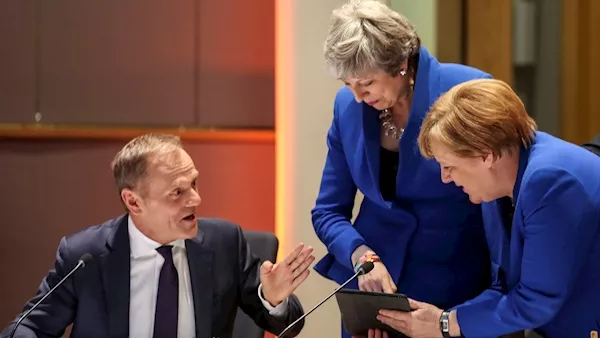Theresa May is facing British politicians after the EU offered the UK a six-month Brexit delay, pushing the withdrawal date to Halloween.
The British Prime Minister is making a statement to the House of Commons today following the second extension to the Brexit process, which definitively stopped the clock on a no-deal withdrawal happening on Friday.
The six-month extension to October 31 was a compromise solution thrashed out by EU leaders after French President Emmanuel Macron dug-in against a longer delay lasting into 2020.
Here Political Correspondent, Fiachra Ó Cionnaith, looks at what it means for Ireland and what happens next in the process.
What does the latest Brexit deadline mean?
At a tense behind-closed-doors EU summit meeting on Wednesday night, EU leaders agreed to extend the Brexit deadline until October 31 - Halloween night.

As demanded by London, the deal will allow Britain to still leave at any point up to this date if MPs back the existing EU-UK divorce deal. However, it comes with strict MEP election, "no sabotage" clause and June review conditions.
Was the decision unanimous?
No. In the first real chink in the EU united wall, French president Emmanuel Macron risked destroying the entire deal on Wednesday night by insisting he would veto any plan that saw Britain stay past the May MEP elections.
It is understood that during EU talks, 17 leaders - including Taoiseach Leo Varadkar - wanted a December extension, four wanted an extension up to the end of the current European Commission's term in November, four more wanted a two-stage extension which led to the June review add-in, while Mr Macron wanted none of the above.

The French president's point is that Britain cannot be trusted not to sabotage the EU. However, he was also pushing to replace German chancellor Angela Merkel as the de-facto leader of the group. His future view of the deal's progress will now be crucial.
What conditions come with the deal?
To secure the October 31 extension Britain must run MEP candidates, which Ms May has yet to officially accept.
Britain will also have to sign up to a gentleman's agreement not to deliberately damage the EU's work from the inside over the coming months and will have its progress on this reviewed at the June EU summit.
What does this mean for the Irish MEP elections?
Due to Brexit, Ireland's MEP numbers were going to increase from 11 politicians to 13 to fill the void left by Britain. However, if Britain runs MEP candidates as per the deal, a winning Irish MEP in both Ireland South and Dublin will have their new role taken away from them.
Is there really a risk Britain could use the extra time to undermine the EU?
Yes, and arch-Brexiteer Jacob Rees-Mogg made this exact threat just last week, with a flood of pro-Brexit MEPs the most obvious concern.

What happens next?
Ms May will now go back to Westminster, again, to try and convince MPs to finally back her three-times rejected deal, potentially with the support of Labour's Jeremy Corbyn. and is also facing renewed calls to quit.
A general election, second referendum and even the appointment of a hard-line pro-Brexit prime minister are also just as likely in the coming months.
What about Ireland, does the delay increase the chances of a snap general election here?
Senior sources in both Fine Gael and Fianna Fáil rejected the idea yesterday, with one saying rumours of a snap vote are "all bull". However, that logic hasn't stopped the Leinster House rumour mill, with TDs and senators convinced a snap vote is imminent.






